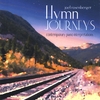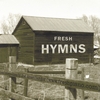Today I'm pleased to present to you the world premier (I've been wanting to say that) of my piano arrangement of Panis Angelicus, the classic work by César Franck (1822-1890.) I suppose that various lyrics have been penned to this melody, but the original words are in Latin. The title is taken from the first line, and the lyrics are thought provoking. Here's an attempted translation of the first verse:
Panis Angelicus fit panis hominum
Bread of angels, made the bread of man
Dat panis coelicus figuris terminum
The heavenly bread given a bounded form
O res mirabilis
Oh wonderful thing
Manducat Dominum
Eating the Lord
Pauper, pauper, servus et humilis
Poor, poor, a servant and humble
In John 6:48-58 (below), Christ invites us to dinner... with him as the main course. Dining on his flesh and blood provides far more nutritional value than eating our vegetables, as "he that eateth of this bread shall live for ever." This passage reminds me of the eucharist (or communion), where we take of the bread and wine (or grape juice, as the case may be.) The belief as to whether the bread and wine are literally or metaphorically Christ's blood and body, or somewhere in between, vary by denomination. But 1 Corinthians 11:24 provides a stern reminder of the solemnity of this sacrament, as "whosoever shall eat this bread, and drink this cup of the Lord, unworthily, shall be guilty of the body and blood of the Lord." This is serious business. If the bread and cup are but symbolic, they are a powerful symbol indeed.
I invite you to meditate on the scriptures below as you listen to Panis Angelicus.
Click Here to Listen
John 6:48-58 (KJV)
I am that bread of life. Your fathers did eat manna in the wilderness, and are dead. This is the bread which cometh down from heaven, that a man may eat thereof, and not die. I am the living bread which came down from heaven: if any man eat of this bread, he shall live for ever: and the bread that I will give is my flesh, which I will give for the life of the world. The Jews therefore strove among themselves, saying, How can this man give us his flesh to eat? Then Jesus said unto them, Verily, verily, I say unto you, Except ye eat the flesh of the Son of man, and drink his blood, ye have no life in you. Whoso eateth my flesh, and drinketh my blood, hath eternal life; and I will raise him up at the last day. For my flesh is meat indeed, and my blood is drink indeed. He that eateth my flesh, and drinketh my blood, dwelleth in me, and I in him. As the living Father hath sent me, and I live by the Father: so he that eateth me, even he shall live by me. This is that bread which came down from heaven: not as your fathers did eat manna, and are dead: he that eateth of this bread shall live for ever.
1 Corinthians 11:24-29 (KJV)
And when he had given thanks, he brake it, and said, Take, eat: this is my body, which is broken for you: this do in remembrance of me. After the same manner also he took the cup, when he had supped, saying, This cup is the new testament in my blood: this do ye, as oft as ye drink it, in remembrance of me. For as often as ye eat this bread, and drink this cup, ye do shew the Lord's death till he come. Wherefore whosoever shall eat this bread, and drink this cup of the Lord, unworthily, shall be guilty of the body and blood of the Lord. But let a man examine himself, and so let him eat of that bread, and drink of that cup. For he that eateth and drinketh unworthily, eateth and drinketh damnation to himself, not discerning the Lord's body.
View Entire Index of Songs and Scores






